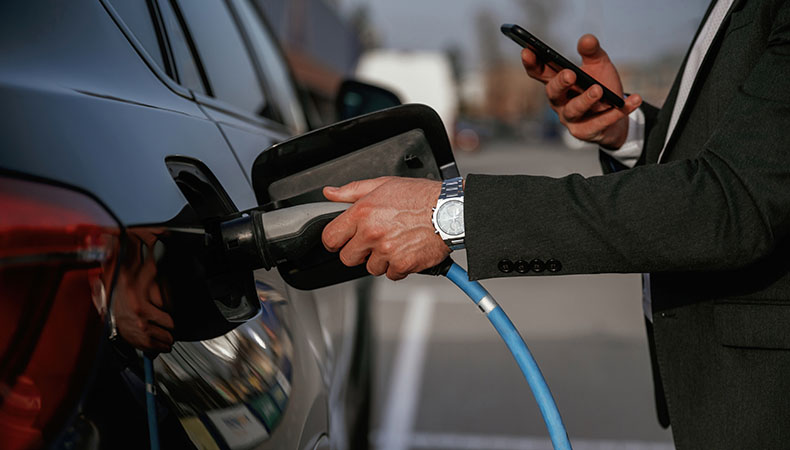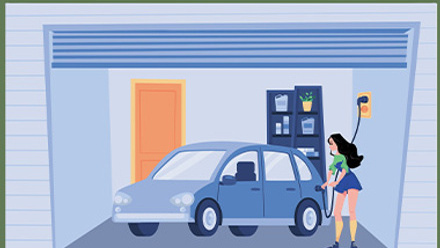How electric vehicles can help us reach net zero targets
As part of an automotive industry worth around £14 billion to the UK economy, electric vehicles have an increasingly important role to play if the country is to achieve its net-zero targets by 2050.
Of the 40m+ vehicles on UK roads, 59% are fuelled by petrol and 35% are diesel.
Only 8% are fully or partially fuelled by electric, according to personal finance site Nimblefins, a 14x increase since 2014.
Transport was responsible for 26% of total UK greenhouse gas emissions in 2021 – the UK’s largest emitting sector, according to a recent government research briefing.
This is where EVs can play a crucial role in meeting the UK government’s net-zero carbon emissions targets by 2050.
Employers who provide EVs through salary sacrifice car schemes - at no cost for them to set up or manage - are at the forefront of this push.
They are encouraging early adoption of greener, cleaner vehicles from individuals who may not otherwise be able to afford them privately.
Tax advantages can help
Data, published recently by the British Vehicle Rental and Leasing Association (BVRLA), found that take-up of salary sacrifice car schemes rose 47% in the final three months of 2023 compared with the same period in 2022, with 84% of employees opting for an EV.
When motorists don’t have access to the tax advantages of a salary sacrifice scheme, the picture is different.
The BVRLA found that 66% of private lease agreements in the same period of last year were for petrol vehicles, with EVs representing only 16%. We therefore can’t take salary sacrifice schemes for granted.
Widespread EV adoption needs continued endorsement at national government level, together with a clear line of sight of what to expect, whether that is regulatory mandates or financial incentives.
With the new government, the sector is keen to have clarity for the future so employers can make informed business decisions.
That’s why we’re hoping next month’s budget will include some of these commitments.
Visibility beyond 2028
EV salary sacrifice schemes work by sacrificing a portion of an employee’s salary (prior to tax).
Taking an EV on a salary sacrifice scheme can mean that servicing costs, insurance and other services such as breakdown cover and replacement tyres are included in the monthly amount, which can mean a significant tax saving for the employee.
An additional benefit-in-kind (BiK) is also payable, fixed at 2% until April 2025 then at 3% in 2025/26, 4% in 2026/27 and finally 5% in 2027/2028.
Low BiK has been universally accepted in the leasing sector as being one of the main catalysts to mass EV adoption, as, when coupled with salary sacrifice, it makes EVs affordable for taxpayers in all tax bands.
Even with the rates increasing over the past few years, this affordability and adoption has continued.
At the moment, it’s unclear what will happen to BiK rates after April 2028, and both employers and employees need clarity on this if they are to continue to adopt EVs as the government has been eager for them to do.
Keep the original 2030 ICE vehicle ban
The 2018 Road to Zero Strategy, a long-term initiative which aims to phase out high-emission vehicles by 2030 and phase in low or zero-emission vehicles (including EVs) came into force in 2020.
But the 2030 date, which would have seen the ban of all new ICE vehicle sales, was pushed back until 2035 by the last Conservative government.
In its election manifesto, Labour pledged to restore the original 2030 deadline which, if included in the budget, would be a welcome move.
Further delays on zero-emission targets will hamper progress already made.
For example, figures from the Society of Motor Manufacturers and Traders (SMMT) show that plug-in vehicles now account for the ‘biggest growth’ in car ownership since 2016, with one in 40 of all vehicles on UK roads being zero emission.
This shows that the strategy is working: fiscal incentives at national and local level have encouraged investment in zero emission vehicles.
But there’s a real concern that a five-year delay of the ban of all new ICE vehicle sales will either reverse or stall this positive trend.
A commitment to keep the original 2030 date is essential if progress is to continue.
Grants for office charge points
There have been frequent industry calls for faster investment in EV infrastructure and this is essential if wider adoption of EVs is to be encouraged.
Currently, there is just one public charger for every 35 EVs on the road according to the SMMT, which plays into range anxiety concerns.
According to the 2024 Tusker EV Driver Survey, the situation with the UK’s public charging infrastructure is the most common concern about switching to an electric car, cited by 73% of respondents, despite the survey also showing that the range of an average new EV being more than is required for 72% of drivers’ weekly commutes.
Organisations are able to support both employees and the EV infrastructure by providing office charge points.
Indeed, the current Workplace Charging Scheme grant enables employers to install EV charge points at their place of work.
This, however, is due to end in March 2025.
Office charge points are highly convenient for employees with EVs, particularly for those who are unable to have charge points installed at home either due to cost or because there is no off-road parking.
So with 68% of commuters driving to work, there is a huge opportunity to encourage the transition from petrol or diesel-powered vehicles to EVs.
Providing convenient charge points at the place of work will directly appeal to employees who may be considering the transition.
Extending the Workplace Charging Scheme grant would mean many more businesses can take advantage of the incentive.
A measure to extend this grant in the 2024 budget would be encouraged.
Commit to protect standard taxpayers
There’s already been a commitment to protect standard taxpayers by not raising income tax, employee national insurance and VAT, and if this proves correct, EV salary sacrifice schemes can continue to support inclusivity and affordability.
One of the big benefits these schemes bring to employees is the peace of mind that additional, ad-hoc costs are covered, whether it’s replacing a tyre or a cracked windshield.
All of this is included in many of the salary sacrifice schemes available.
Supplied by REBA Associate Member, Tusker
Tusker is the UK’s leader in salary sacrifice cars. Part of Lloyds Banking Group, it has more than 15 years’ experience in offering an affordable way for employees to drive a new, fully insured, and maintained car. Its scheme, which is available to over 1.8 million UK employees, offers a range of options, from pure electric cars to hybrids and even traditional petrol and diesel vehicles. It provides a tailored scheme for organisations’ individual needs.








